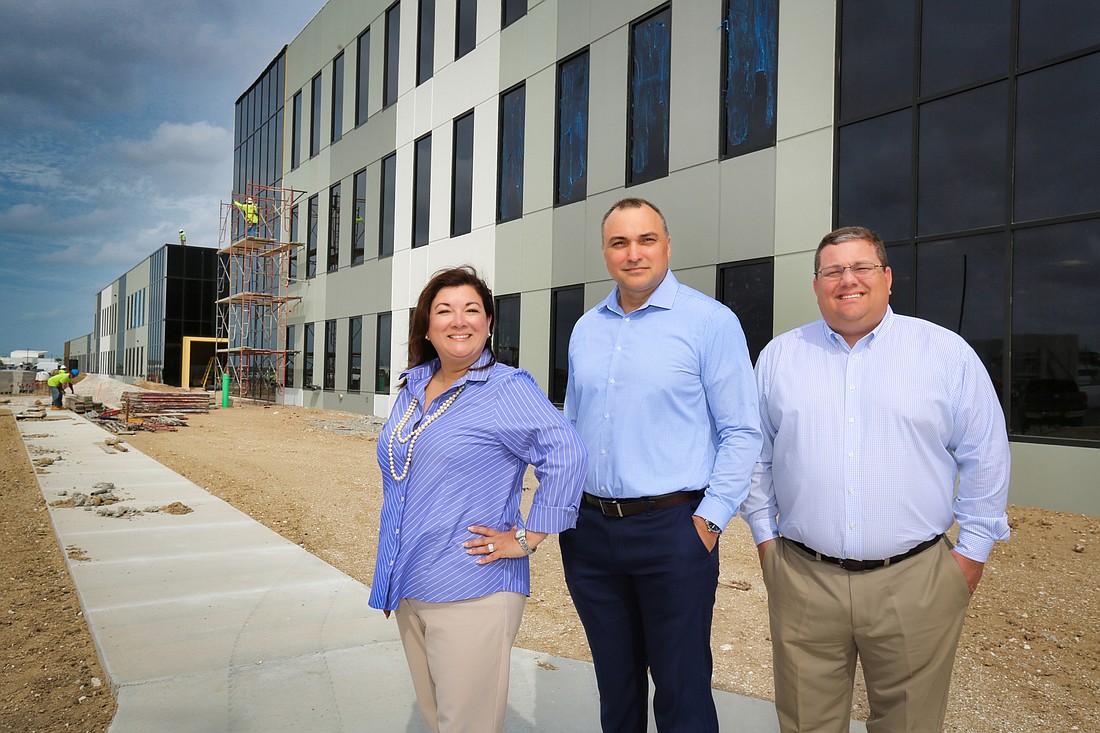- December 13, 2025
-
-
Loading

Loading

NeoGenomics global director of facilities and operations Helen Edenfield takes great pride in putting a premium on aesthetics in the design of the firm’s sleek new Fort Myers headquarters.
That’s down to recessed walls for lockers used by technicians at the $444.5 million cancer diagnostics testing and pharma services firm. Hand-sanitizing stations are in recessed walls, too. “I want everything in here to look like it has a purpose,” she says. “Everything has a home. Nothing sticks out.”
While nothing sticks out of the walls, the project itself, on a 14-acre parcel near the intersection of Alico Road and Three Oaks Parkway, is rather notable. For one, at $60 million, it’s one of the largest ongoing commercial construction projects in the region. And specifically for NeoGenomics, the new home, officials say, includes a state-of-the-art molecular lab with next generation sequencing capabilities, in addition to space that can support clinical trials for new oncology therapeutics.
NeoGenomics’ clients include a range of oncologists, pathologists, pharmaceutical companies, academic centers and others. The publicly traded firm designated $11 million for the project in the first quarter, according to a recent earnings call.
The team around the project includes Seagate Development Group and Studio+ architecture, both based in Fort Myers. Construction began in March 2020 and is expected to be complete in August, with staff moving into the space starting in the fall and through winter. Edenfield credits the team of architects, planners and builders working nearly seamlessly together with the success of the project so far. “If you picked the wrong team on a project like this,” says Edenfield, global director of facilities and operations at NeoGenomics, “trying to play catch-up is impossible.”
The complex is 150,000 square feet spread through two buildings. That’s double NeoGenomics’ current headquarters space, near the Gateway area of Fort Myers, which is some 75,000 square feet spread through five buildings.
Inside, there are 10 pathology suites, with room to expand to 19. That’s up from seven in the previous building. The complex includes a commercial-grade kitchen and several outdoor spaces for employees. NeoGenomics plans to have about 350 to 400 employees work out of the headquarters at the beginning, with room to house some 700 employees.
Through the expansion project NeoGenomics is eligible for several state and Lee County incentives and tax breaks because it’s in a “high-impact sector” of the economy, according to a statement. Florida officials committed to a tax credit equal to up to 5% of the eligible capital costs for up to 20 years for the cost of the building. That kicks in after NeoGenomics spends at least $25 million on the project and creates at least 100 jobs.
The Florida Department of Economic Opportunity has also agreed to provide NeoGenomics up to $1.77 million in tax refunds in return for hiring at least 295 people over five years. Those employees must be paid an average annual wage of at least $59,900, the release states. Lee County has pushed the package to more than $2.1 million, with an additional $354,000 in subsidies.
With all those employees and future employees, another piece of the headquarters project is an invaluable commodity in any fast-growing business: parking spaces. The complex will have 787 parking spots — more than double the previous location, which had 300 spots.
The NeoGenomics complex also offers some natural, peaceful elements. It backs up to a preserve, both a beautification point on the design and a defensive move to make sure no one else builds right next door, Edenfield says. Studio+ CEO Damon Romanello, during a recent walk-through tour, says visual access to the preserve is key to the building’s flow. “You’re never in an interior corridor or hallway without a view to the outside,” Romanello says. “People pay to have water features that look like an outside mural. We have that here naturally.”
One outside factor that’s helped drive the success of the project, say officials, is cooperation from Lee County officials. While Seagate CEO Matt Price says early on he didn’t think county staffers “really knew what a molecular lab was,” they were eager to work with developers — not create roadblocks.
The main obstacles, instead of the county, were obvious ones: the pandemic, labor shortages, material shortages and high materials prices. “We just adopted and kept on going,” Romanello says. “There’s always going to be some hurdles to overcome.”
Price agrees. “People who struggle in a time of crisis are people who have not planned ahead,” he says. “Nothing is insurmountable in this business. Usually it just takes time and money.”